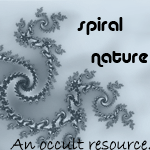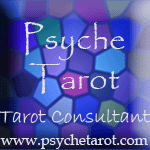Love is the Law: Philios, True Will and the Great Work (Part I)
By Kara Rae Garland | April 7, 2008 | Print This Post | E-mail This Post | 10 Comments
Kara is a second generation chaote hailing from just north of Portland, OR. She’s been published in Konton, Key23, participated in the Infictive Hyperwiki and Occulterati podcast, and now graces us with her presence here on ahrfoundation.org as our first guest blogger.
This is Part I of a two part post, see tomorrow’s post for Part II.
I do not believe in sin as typically described by the various sects of the world’s major religions. In my heart, there are two kinds of sin: sins against humanity (abuses of human rights) and sins against yourself. It is with the latter that the following missive is primarily concerned, heavily informed by Thelema, New Age philosophies and Modern Satanism.
A sin against yourself is something that only you can judge. You sin against yourself every time you do something that goes directly against your True Will. When you do not live up to your honest potential, when what you do holds you back instead of propelling you forth, even if that thing is refusing to forgive yourself for past mishaps, I believe you are sinning against yourself. (It should be noted that I do not feel this applies to normal, natural, healthy periods of stagnation, contemplation and plateau states.)
I used to think that the concept of True Will was malarkey. No one I spoke with could tell me what True Will was or how to discover it. I kept asking and wondering what kind of person doesn’t know what he or she really wants in life? But then I took a good look at the society around me, and I saw that we tie ourselves into secret knots all the time, constantly confusing ourselves about what we want and what is best.
Not to fear. Clarity of vision is possible and, eventually, one must realize, ideal.
Life is something grand and sublime, even if difficult and traumatic. It is not to be muddled through forever. A certain peace with what is must eventually transpire or a kind of self-implosion occurs and that individual life seems to become a moot point or a lost cause, doomed to loop in desperation. What’s the point of living if you aren’t even going to do yourself justice?
This is not the life for you.
I can think of few things worse than deathbed regrets. Glorify yourself and live the life you know you mean for yourself. Do not waste this grand process on confusion or self-delusion or illusory struggling for things that fail to satisfy even the most basic urges. Everyone deserves to eventually get what they most deeply crave (and I don’t believe that is ever something that must infringe on the rights of other humans.) Even the murderer, the rapist, the pedophile and the abuser are seeking something beyond the vile acts they are committing: some measure of justice for past wrongs, acceptance and understanding, love. Their methods of achievement are warped by illness, usually stemming from the same kinds of abuse and a deprivation of the things everyone needs most: love, acceptance, purpose, but also basic physical necessities like shelter and vital nutrients.
Love is the Law.
True Love or Philios, as discussed here, is unconditional compassion. It is not possessive. It is devoid of fears and insecurities. It is heart chakra wide open, and it acknowledges that suffering exists, that suffering must exist, even while attempting to soothe suffering because too much suffering leads to the kinds of dysfunctions mentioned above. And Love does not abide. Love strives for right thinking and right action.
It is okay to have compassion for such dysfunctional people as described above, acknowledging the human condition, even while feeling disgust and anger at their methods. To feel compassion is not to say that atrocities such as rape or murder are okay, but to acknowledge the suffering and the illness that have led up to the acts committed. Philios, True Love for humankind, insists that one must consider and when possible, attend to, these aspects of suffering. Motions towards healing are the natural inclination of the proponent of Philios, and healing is a vital part of the Great Work.
I have yet to experience anything greater than love in its various manifestations, but especially Philios, compassionate love for self and one’s fellow humans. Love is a fire at the center of human existence. A few years ago, I would have scoffed at such a statement, but now it seems perfectly clear, albeit full of a certain New Age charm.
Self-philios is a prime motivator in the quest for purpose in life. Even in the deepest depression or the coldest rage, love for the self is the hidden seed, often obscured by the most immediate emotions. Depression and anger stem from the same source: proper conditions for love of the self to exist peacefully are not being met. Depression occurs when we are uncomfortable with existence for any reason, when we know deep down that we deserve a better life experience, better conditions and when we feel incapable of serving our needs for any reason. Anger is a secondary emotion that arises from pain. When we are confronted with pain, the ego, deriving from love of self, answers with anger at the source of that pain. We are each figuratively the center of the subjective universe.
Anger and depression are natural things; they are not meant to be eradicated, even in the face of love. They are motivators to great change and progress, a pole of two opposites, gears that come together to grind out the story of human existence. They represent the conflict in the story that must arise to be overcome for the sake of peace and love and joy to reign. But it is an unending process, as long as humanity exists. This is why we have time and history and war.
The trick is to refuse to wallow in either of these emotions, but instead, to actively seek a resolution whenever possible. Some situations seem impossible, but most are limited only by what we deem acceptable or not acceptable in terms of life experiences. Sometimes we have to break our own rules to get ahead.
Kara Rae Garland (Soror Ceilede) is a quirky bibliophile who hails from just north mystical of Portland, OR. She currently works for the world famous Powell’s Books and has been studying the occult for sixteen years. As a second gen chaos magician and rampant blogger, she has been published in Konton magazine and The Best of Konton, as well as online at the webzine formerly known as Key23 (now Key64.net), the Infictive Hyperwiki and has participated in the highly esteemed podcast Occulterati.
If you enjoyed this subscribe to the RSS feed!
What is RSS?





Kara, it’s great to see more of your writing — you are so good at it. :)
One thing I have always found difficult to reconcile is that when my heart is “wide open,” as you discuss, then sometimes I am unable to act — either in my own best interest or anyone else’s — because i am compassionate with too many things, all of which conflict with each other. I find that being compassionate but not allowing the heart to rule my judgment helps much more. What do you think?
Hi Beth. I’m sorry it has taken me so long to respond, and I hope that my response is satisfactory.
I feel that part of the process of Knowledge & Conversation is the marriage of logic & intuition, heart & mind. From this new perspective, both lenses are filtered together, through one another, if that makes sense, allowing one to see a bigger picture. Your heart may be wide open, but with this coagulation, you gain the wisdom of the heart that allows you to see the best course of action in accordance with your compassion. Heart is grounded with rational thought, mind is spiritualized with deep compassion at the same time, and these twin courses flow together, into one another, through each other.
Hi! That makes perfect sense — being able to have that “witness,” whether it’s thought of as HGA or something else, really does help. There are moments when that consciousness can step in and say, “Wait a moment, this isn’t right,” or “Go ahead, you’re safe here.”
This was one of the most succinct summations of the Purpose of Life (LOVE!) that I’ve yet seen. All the World’s Religions focus on Love as the central message to at-one-ment with the Godhead; Kara gives an excellent and down-to-earth explanation that would easily explain many a Mystic’s supposedly “ineffable” philosophy of Life.
I appreciate your enthusiasm. But I’m not entirely sure I was saying what you think I was saying! :D
You know, the term “Impeccable” actually means “Without Sin against Self”.
It brings, thoroughly, to my mind the Castaneda ideal of “Acting Impeccably”, this Self Love.
I must admit, though, I feel a bit perplexed;
Always I had understood the loves as
Agape (Devoted, Unconditional, Spiritual Love (which is how I read a lot of your attributions to Philios, here)
Eros (Romantic, Intimate, Sexual Love)
and Philia (Friendship, Companionship, Care between Parents and Children, Caretakers and Pets, etc.)
In this sense, the broadening of the term of Philios to represent a deep connection to humanity based solely on the fact that we all find ourselves “in it together” feels extraordinarily benevolent and exemplary.
I look forward to reading the second half of this article.
I found it touched on relevant topics, without ever dropping into highly Occulty slang – available to the (inescapable reality of) every day you ‘n me ‘n he ‘n she.
Well done, Soror
According to my understanding, there are five kinds of love in the Greek model:
http://en.wikipedia.org/wiki/Greek_words_for_love
But they can have fuzzy distinctions and sometimes flow into one another.
Briefly, my model is:
Eros – romantic and/or sexual love
Philios – love of friends, neighbors, community, humanity
Storge – familial love
Thelema – love of freedom, objects, concepts
Agape – love of God, an all-encompassing uniting love
(Of these, my concept of Thelema is presently least developed.)
I believe that these distinctions give us a lot to think about.
What did you think of the second part of the piece?
Briefly, my model of the five loves:
Eros: Romantic and/or sexual love, love expressed through sensual pleasures.
Philios: Love of friends, neighbors, community, humanity.
Storge: Familial love, parent and child, siblings, etc.
Thelema: Love of freedom, concepts, sometimes objects. Love of truth and beauty. (This is the love I have the least developed concept of presently.)
Agape: love of God, an all-encompassing unconditional love, the kind of love that only a God could have.
What did you think of the second part?
[...] sexy (just look at her! way hotter than Manly P Hall) and brilliant (check out her essay “Love is the Law: Philios, True Will and the Great Work“) and an occultist (bibliophilic second gen chaote) – need I say [...]
[...] of Tarot, reviews and, of course, our first guest blogger: Kara Rae Garland and her two part essay Love is the Law. We also delved deeper into definitions of magick, what we mean, also looking at reader feedback [...]